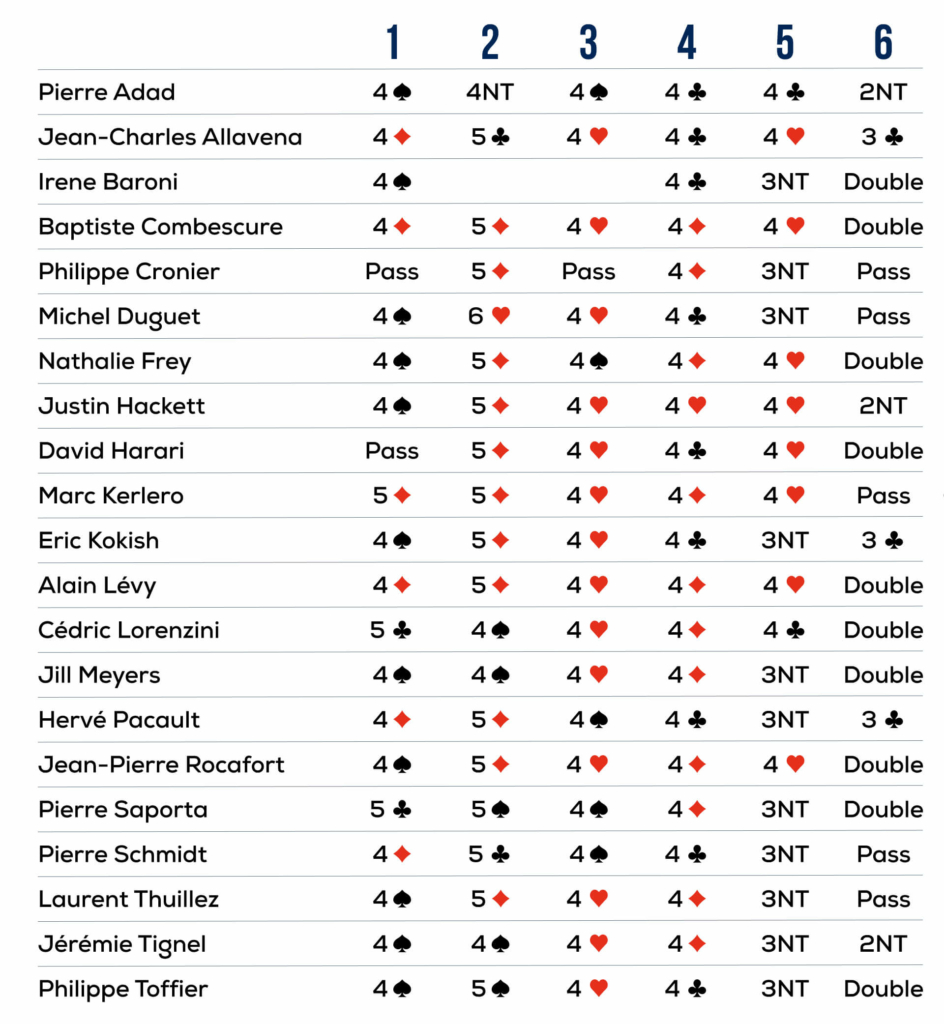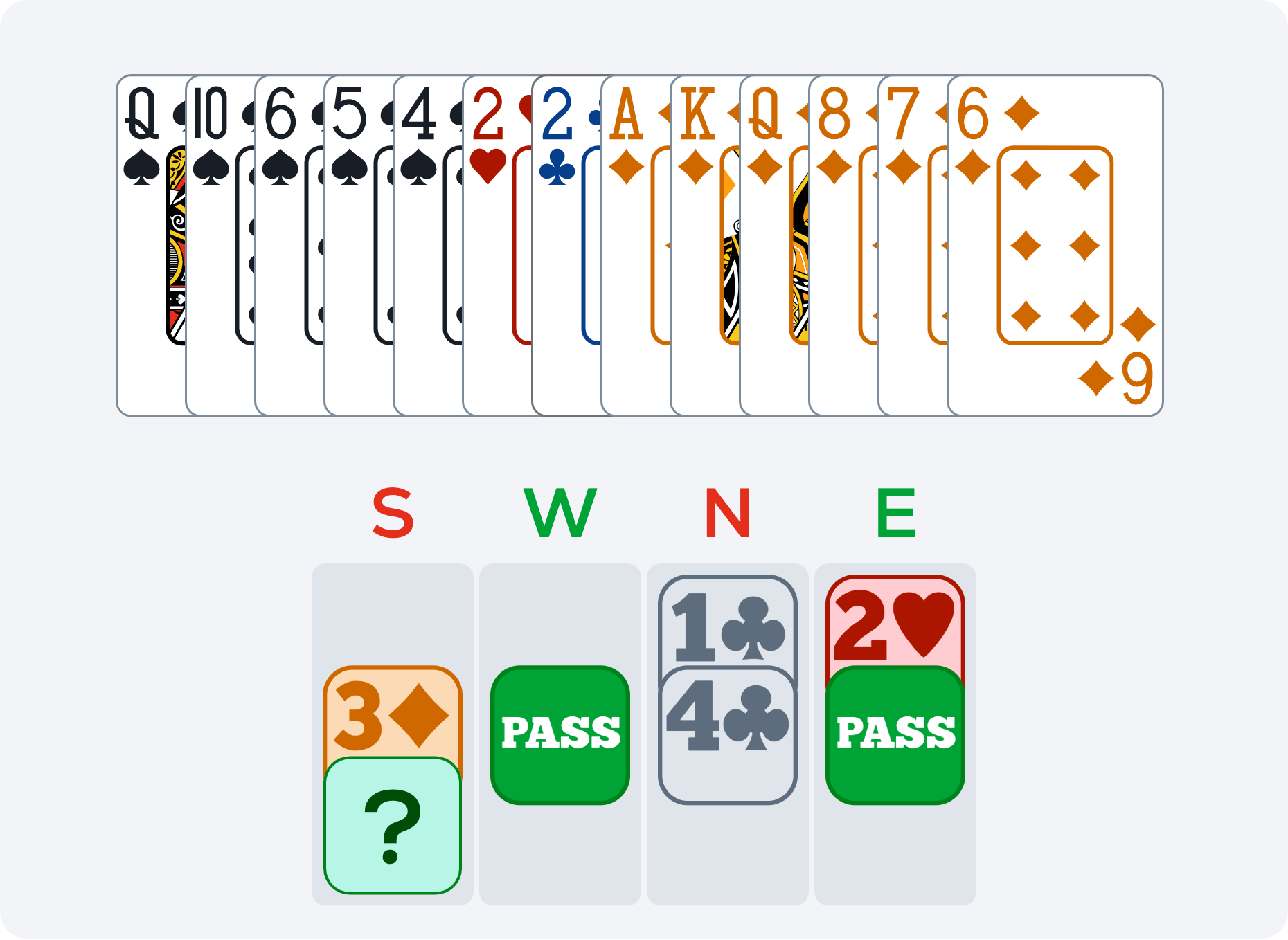
January bidding contest: the results!

Summary
The experts’ answers
Deal 1: Are the spades going down the drain?
Deal 2: Here we go again
Deal 3: Wishing to go back
Deal 4: Navigating difficulty on sight
Deal 5: Everyone has a good hand
Deal 6: A real dilemma
The winners
The experts’ answers

Deal 1: Are the spades going down the drain?

Pairs tournament
Most of the experts decided to bid their hand naturally with a greater or lesser degree of confidence, on the basis that their partner would understand their hand to be 6-5 shape. From the more pessimistic to the more optimistic:
Toffier: « 4♠. Yes, I would have said 2♠, in anticipation of this and for several reasons. You will find out straightaway whether partner has three cards in spades. If he says 3♣, you say 3♦ and if he says 3NT, that is perfect. When forced to bid 3♦, the problem becomes unsolvable as there is no good bid. So, let us say 4♠ to pass the time; a bid which does not promise five cards in spades, of course… »
Rocafort: « 4♠. That could go badly but I cannot see me unilaterally giving up on game in spades. »
Tignel: « 4♠. Even at pairs, there is no question of it being passed as the 4♣ was strong (or very shapely). I am therefore continuing to describe my hand: 4♠ should show 6-5 as North has denied four cards in spades (having not bid 3♠). I would have bid 3♦ in order to better be able to show my two-suiter in case of the opponents pre-empting in 3♥ or 4♥. »
Jill Meyers: « 4♠. My second suit, hoping that my partner takes me to be 6-5. I would indeed have started with 3♦. »
Hackett: « 4♠. I would not have said 2♠ as then I would never be able to show my diamonds. As partner did not say 3♠, I am probably showing 6-5. »
Thuillez: « 4♠. That should show 6-5 as partner has denied four cards in spades. Agree with the 3♦ bid. »
Adad: « 4♠. I am describing my hand, my partner quite possibly being 3-3-1-6. By saying 4♣, partner is accepting playing in 5 in case of a misfit. »
I admit to being somewhat in agreement. If you admit that partner is bound to say 3♠ with four cards, it is hard to see what else a 4♠ bid could mean if it is not a 6-5 hand. This was not, however, the view of a significant number of experts.
Rather surprisingly, there were people who passed, probably influenced by the note about it being pairs.
Harari: « Pass. I know: it’s forcing. Nevertheless, it seems like we are completely misfitting (partner has wastage in hearts, given West’s pass at favourable vulnerability) and there is a good chance that we have no game on. At pairs, burying a game is less serious than at teams. I would indeed have bid 2♠ on the first round, a 5-3 spade fit often being difficult to find later on. »
Cronier: « Pass. The start of the sequence is mystifying. Why, if North holds a good single-suiter in clubs, did they not say 3♥ to ask for a heart stop? Why not bid 3NT themselves? And where are all the hearts? I get the impression that North nust have seven not-great cards in clubs and no doubt three cards in hearts. I do not see which contract we might be making… So I pass! »
As it happened, North held ♠K ♥AK43 ♦54 ♣AKJ875. Should they settle for 3NT? Difficult; but the pass over 4♣ would not have been ideal!
Two braver experts settled for a tiny fit.
Lorenzini: « 5♣. Even at pairs, I would have started with 3♦ due to the quality of the suit. My plan would have been to say 3♠ and then 4♠ if possible. Clearly, my choice would have been different with ♠AK654 and ♦J87652. 4♣ should show a special hand with which one refuses to play in 3NT, as a 3♥ cuebid was available for playing in 3NT. Maybe seven clubs and four hearts. I do not believe that my partner may pass over 4♠ so I would have bid 5♣ to end the auction. »
Saporta: « 5♣. Bidding spades at this stage would have the look if a cuebid. I would have bid 2♠ on the first round, a mess space-consuming bid. »
Finally, there were all those who preferred to confirm their good diamonds.
Lévy: « 4♦. Too late for playing in spades; North will not take a 4♠ bid as natural. »
Pacault: « 4♦. North would say 3♥ with a normal hand without a heart stop. This 4♣ bid shows long clubs, probably seven cards. Is it forcing? In a duplicate, yes, as 3NT has been bypassed without being investigated and 3♦ promises a follow-up bid. 4♦ has the advantage of not being forcing (repeating a suit) and of suggesting a viable contract. North will bid again if his hand allows it. »
Schmidt: « 4♦. I am waiting to see my partner’s hand before I decided whether I should have said 2♠! In any case, it has — for me — become impossible to play in the suit (4♠ at this stage would never be understood as natural). No choice but to confirm the quality of the diamonds now. I will specify that 3♦ in my partnership is forcing to game. »
La suite est réservée aux abonnés Funbridge Premium et Premium+
To read the experts’s answers please log in to a valid Premium or Premium+ account.
6 Comments
Leave a Reply
You must be logged in to post a comment.




Could you send me m’y results please
Hello ibugigi, your funbridge pseudo does not appear on the results, you may not have submit your answers.
What do you mean?
je n’ai pas trouvé mon résultat
In the analysis, the visuals of the hands are cropped and we cannot see the entire hand
I didn’t see my result